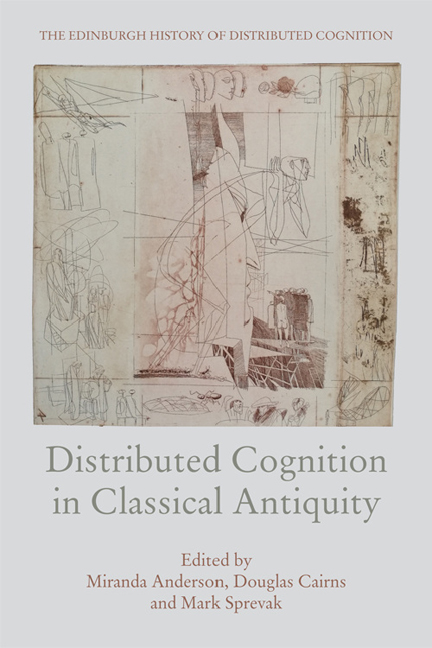Book contents
- Frontmatter
- Contents
- List of Illustrations
- Series Preface
- Miscellaneous Frontmatter
- 1 Distributed Cognition and the Humanities
- 2 Distributed Cognition and the Classics
- 3 Physical Sciences: Ptolemy's Extended Mind
- 4 Distributed Cognition and the Diffusion of Information Technologies in the Roman World
- 5 Mask as Mind Tool: A Methodology of Material Engagement
- 6 Embodied, Extended and Distributed Cognition in Roman Technical Practice
- 7 Roman-period Theatres as Distributed Cognitive Micro-ecologies
- 8 Cognition, Emotions and the Feeling Body in the Hippocratic Corpus
- 9 Enactivism and Embodied Cognition in Stoicism and Plato's Timaeus
- 10 Enargeia, Enactivism and the Ancient Readerly Imagination
- 11 Group Minds in Classical Athens? Chorus and Dēmos as Case Studies of Collective Cognition
- 12 One Soul in Two Bodies: Distributed Cognition and Ancient Greek Friendship
- 13 Distributed Cognition and its Discontents: A Dialogue across History and Artistic Genre
- Notes on Contributors
- Bibliography
- Index
1 - Distributed Cognition and the Humanities
Published online by Cambridge University Press: 12 November 2019
- Frontmatter
- Contents
- List of Illustrations
- Series Preface
- Miscellaneous Frontmatter
- 1 Distributed Cognition and the Humanities
- 2 Distributed Cognition and the Classics
- 3 Physical Sciences: Ptolemy's Extended Mind
- 4 Distributed Cognition and the Diffusion of Information Technologies in the Roman World
- 5 Mask as Mind Tool: A Methodology of Material Engagement
- 6 Embodied, Extended and Distributed Cognition in Roman Technical Practice
- 7 Roman-period Theatres as Distributed Cognitive Micro-ecologies
- 8 Cognition, Emotions and the Feeling Body in the Hippocratic Corpus
- 9 Enactivism and Embodied Cognition in Stoicism and Plato's Timaeus
- 10 Enargeia, Enactivism and the Ancient Readerly Imagination
- 11 Group Minds in Classical Athens? Chorus and Dēmos as Case Studies of Collective Cognition
- 12 One Soul in Two Bodies: Distributed Cognition and Ancient Greek Friendship
- 13 Distributed Cognition and its Discontents: A Dialogue across History and Artistic Genre
- Notes on Contributors
- Bibliography
- Index
Summary
Consider counting on your fingers; or solving a challenging mathematical problem using pen and paper (or Napier's bones, or a slide-rule); or the way in which we routinely offload the psychological task of remembering phone numbers on to our ubiquitous mobile phones; or a brainstorming scenario in which new creative ideas emerge from a process of collective group interaction; or the manner in which the intelligent feat of ship navigation is realised through a pattern of embodied, information-communicating social exchanges between crew members who, individually, perform purely local information-processing tasks (such as bearing taking) using specialised technology. All of these examples of brain-body-world collaboration are, potentially at least, instances of the phenomenon that, illuminated from a historical perspective, is the topic of this volume. That phenomenon is distributed cognition.
So what, precisely, is distributed cognition? The term itself is standardly traced to the pioneering work of the cognitive anthropologist Edwin Hutchins (see, canonically, Hutchins 1995, from where the example of ship navigation is taken). However, in using this introduction to sketch the conceptual background for the chapters that follow, we shall adopt an understanding of distributed cognition that arguably diverges somewhat from Hutchins's own (for one thing, we make no demand that the target elements, whether located inside or outside the brain, should be understood as representational media; see e.g. Hutchins 1995: 373). Here we are aiming for a general and inclusive notion of cognition alongside a general and inclusive notion of what it means for cognition to be distributed. Thus the term ‘cognition’ should be understood liberally, as it routinely is in the day-to-day business of cognitive science, as picking out the domain of the psychological, where that domain encompasses phenomena that we often identify using terms such as mind, thought, reasoning, perception, imagination, intelligence, emotion and experience (this list is not exhaustive), and includes various conscious, unconscious-but-potentially-conscious, and strictly non-conscious states and processes. Given this broad conception of what cognition is, cognition may be said to be distributed when it is, in some way, spread out over the brain, the non-neural body and (in many paradigm cases) an environment consisting of objects, tools, other artefacts, texts, individuals, groups and/or social/institutional structures. Advocates of distributed cognition argue that a great many examples of the kinds of cognitive phenomena identified above (reasoning, perception, emotion, etc.) are spread out in this way.
- Type
- Chapter
- Information
- Distributed Cognition in Classical Antiquity , pp. 1 - 17Publisher: Edinburgh University PressPrint publication year: 2017



